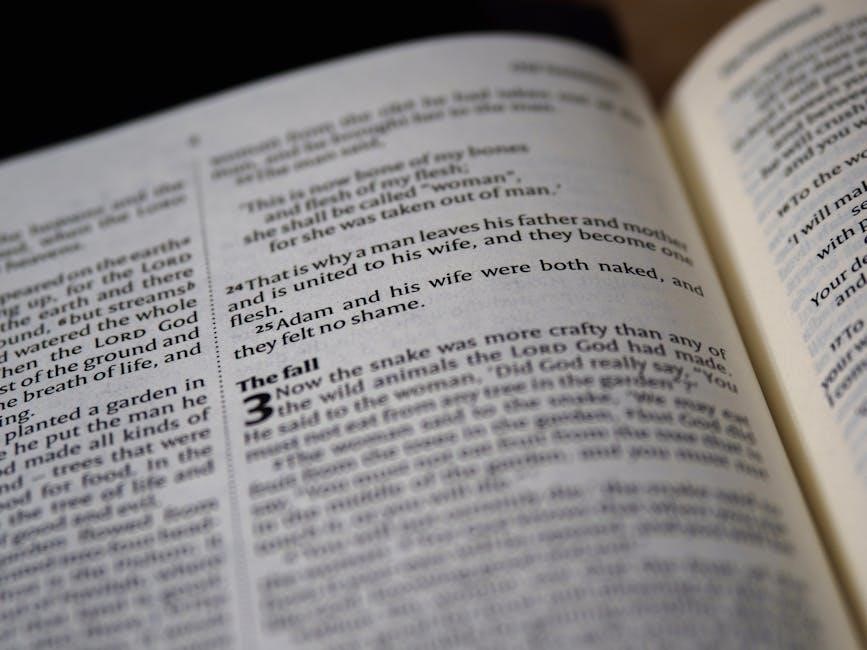
The Book of Genesis, the first book of the Bible, explores the creation of the world, humanity’s early history, and the patriarchal narratives․ It lays the foundation for understanding God’s relationship with humanity, emphasizing themes of covenant, redemption, and divine grace․ Chapters 1-50 provide a comprehensive overview, from the creation story to the lives of Abraham, Isaac, Jacob, and Joseph, highlighting God’s plan and promise․

Overview of the Book’s Structure
The Book of Genesis is structured into two main sections․ The first section, chapters 1-11, recounts the primeval history, detailing creation, the fall of humanity, the flood, and the Tower of Babel․ These chapters establish the universal scope of God’s relationship with humanity․ The second section, chapters 12-50, focuses on the patriarchal history, tracing the lives of Abraham, Isaac, Jacob, and Joseph․ This section narrows the narrative to the ancestors of the Israelites, emphasizing God’s promises and covenants․ The book transitions from a global perspective to a familial one, setting the stage for Israel’s history․ This structure underscores themes of creation, redemption, and divine sovereignty, providing a foundation for understanding the rest of the Bible;
Significance of the First 50 Chapters
The first 50 chapters of Genesis are foundational, setting the stage for the entire Bible․ They begin with the creation of the world and humanity, followed by the early history of humanity, including the fall, flood, and Tower of Babel․ These events introduce key themes such as sin, redemption, and divine sovereignty․ The narrative transitions from a global perspective to the patriarchal stories of Abraham, Isaac, Jacob, and Joseph, highlighting God’s covenants and promises․ These chapters establish the theological framework for understanding God’s relationship with humanity and his plan for redemption․ They provide the necessary background for comprehending the rest of the biblical narrative, emphasizing faith, obedience, and God’s faithfulness․
Chapters 1-11 of Genesis recount the creation story, the Garden of Eden, the Fall of Man, Noah’s Ark and the Great Flood, and the Tower of Babel․
The Creation Story (Genesis 1-2)
The creation story in Genesis 1-2 describes God’s orderly creation of the world in six days, with the seventh day being a day of rest․ God speaks the universe into existence, creating light, land, sea, plants, animals, and finally humanity in His own image․ Adam and Eve are placed in the Garden of Eden, given dominion over creation, and instructed not to eat from the tree of knowledge of good and evil․ This narrative establishes the foundation of God’s relationship with humanity, emphasizing humanity’s unique role as God’s image-bearers․ The creation story highlights God’s sovereignty, wisdom, and love, setting the stage for the unfolding of redemption and covenant themes throughout the Bible․
The Fall of Man and Its Consequences (Genesis 3-5)
In Genesis 3-5, the narrative shifts to the fall of humanity․ Deceived by the serpent, Adam and Eve disobey God by eating from the forbidden tree, leading to sin entering the world․ This act of rebellion results in their expulsion from Eden, introducing suffering, death, and a broken relationship with God․ The consequences extend to their descendants, as seen in Cain’s murder of Abel and the increasing wickedness of humanity․ Despite this, God shows grace, providing clothing for Adam and Eve and preserving a righteous lineage through Seth․ These chapters illustrate the universal struggle between obedience and rebellion, setting the stage for humanity’s need for redemption and God’s ongoing plan to restore His relationship with creation․
The Story of Noah and the Great Flood (Genesis 6-9)
Genesis 6-9 recounts the story of Noah and the Great Flood, a pivotal event in the Bible․ Faced with widespread corruption and violence, God judges humanity but chooses to save Noah, a righteous man, and his family․ Noah is instructed to build an ark to preserve himself, his household, and two of every kind of animal․ The flood, sent as punishment, devastates the earth, destroying all life except those on the ark․ After 40 days, the waters recede, revealing a renewed earth․ God establishes a covenant with Noah, promising never again to destroy the earth with a flood, and sets the rainbow as a sign of this promise․ This narrative highlights divine judgment, mercy, and the hope of renewal․
The Tower of Babel and Its Implications (Genesis 10-11)
Genesis 10-11 narrates the story of the Tower of Babel, a significant event in human history․ After the flood, humanity united to build a towering structure to reach the heavens, driven by pride and a desire to make a name for themselves․ God, seeing their unity and potential for wickedness, confounds their language, causing confusion and scattering the people across the earth․ This act of divine intervention halts the construction and explains the origin of diverse languages and nations․ The story underscores human ambition, the consequences of pride, and God’s sovereignty in shaping human destiny․ It also serves as a transition to the patriarchal narratives, focusing on Abraham and God’s plan for a chosen people․
Chapters 12-50 transition from early world history to patriarchal narratives, focusing on Abraham, Isaac, Jacob, and Joseph․ These stories highlight faith, promises, and family dynamics, shaping Israel’s identity․
The Patriarch Abraham (Genesis 12-25)
Abraham, the father of faith, is central to Genesis 12-25․ Called by God to leave Ur, he trusted the divine promise of descendants and land․ His journey highlights obedience, covenant, and divine provision․ Key events include the promise of Isaac, Sarah’s miraculous conception, and Abraham’s willingness to sacrifice Isaac, demonstrating unwavering faith․ Abraham’s interactions with kings and his purchase of land in Canaan emphasize his commitment to God’s promises․ His life exemplifies trust in divine sovereignty and sets the stage for Israel’s history, reinforcing the covenant and redemption themes central to Genesis․
The Patriarch Isaac (Genesis 26)
Isaac, the son of Abraham, is portrayed in Genesis 26 as a man of faith and stability․ His life is less detailed than Abraham’s or Jacob’s, but key events highlight his role․ Isaac reopens the wells his father dug, symbolizing his connection to Abraham’s legacy․ He encounters Abimelech, king of the Philistines, and, like his father, experiences conflicts over water rights and deception regarding his wife Rebekah․ Despite challenges, Isaac remains faithful, trusting God’s promises․ God reaffirms the covenant with Isaac, promising land and descendants, emphasizing Isaac’s role as a bridge between Abraham and Jacob․ His story underscores themes of faith, divine provision, and continuity in God’s plan․

The Patriarch Jacob (Genesis 27-36)
Jacob, the third patriarch, emerges as a complex figure in Genesis 27-36․ His story begins with deception, as he tricks his father Isaac into blessing him instead of his twin brother Esau, leading to familial tension․ Fleeing from Esau’s anger, Jacob encounters God at Bethel, where he receives a divine promise of land and descendants․ His journey continues with his uncle Laban, where he marries Rachel and Leah, and experiences rivalry between his wives․ Jacob’s time with Laban is marked by both prosperity and conflict․ Upon returning home, he wrestles with God, symbolizing his spiritual growth, and is renamed Israel․ His story highlights themes of divine promise, family dynamics, and personal transformation, showcasing Jacob’s evolution from a trickster to a man of faith and leadership․
The Story of Joseph (Genesis 37-50)
The story of Joseph, spanning Genesis 37-50, narrates the life of Jacob’s favored son, whose journey is marked by betrayal, forgiveness, and divine providence․ Jealous of Joseph’s favored status, his brothers sell him into slavery in Egypt․ Despite adversity, Joseph rises to prominence through his wisdom and faith, becoming a trusted advisor to Pharaoh․ His ability to interpret dreams enables Egypt to prepare for a famine, which later brings his brothers to Egypt seeking aid․ Joseph reveals his identity to his brothers, offering forgiveness and reconciliation․ This narrative showcases themes of forgiveness, divine sovereignty, and the fulfillment of God’s promises, culminating in the unity of Jacob’s family in Egypt, where they thrive under Joseph’s care․

Key Themes and Symbolism in Genesis

Genesis explores themes of creation, covenant, and redemption, symbolizing God’s relationship with humanity․ It underscores divine grace, human rebellion, and the promise of restoration through faith and obedience․
Covenant and Redemption
The concept of covenant is central to Genesis, highlighting God’s promises and commitments to humanity․ Beginning with Noah, God establishes a covenant of preservation, pledging never again to destroy the earth with a flood․ The Abrahamic covenant is a pivotal moment, where God promises land, descendants, and blessings to Abraham and his offspring․ This covenant is reaffirmed with Isaac and Jacob, emphasizing God’s faithfulness despite human imperfection․ Redemption is intertwined with these covenants, as God consistently acts to deliver and restore His people, even in the face of rebellion․ The narrative underscores divine grace and the fulfillment of promises, laying the groundwork for Israel’s identity and God’s ultimate plan of redemption through His people․ This theme is foundational to the entire Bible and remains a cornerstone of theological understanding․
Creation and the Nature of God
Genesis 1-2 presents God as the omnipotent Creator who speaks the world into existence with purpose and order․ The creation account highlights God’s sovereignty and wisdom, emphasizing the distinction between the Creator and His creation․ Humanity is uniquely created in God’s image, reflecting His likeness and given dominion over the earth․ This underscores God’s relational nature, as He desires a connection with humanity․ The creation story establishes foundational truths about God’s character, including His omnipotence, love, and desire for relationship․ It also sets the stage for understanding humanity’s role and responsibility within God’s created order․ The narrative portrays God as both transcendent and immanent, actively involved in His creation․ This portrayal of God’s nature is central to the theological framework of Genesis and the entire Bible․
Human Rebellion and Divine Grace
Genesis vividly portrays humanity’s tendency to rebel against God, beginning with Adam and Eve’s disobedience in the Garden of Eden․ Their sin introduces a broken relationship with God and brings suffering into the world․ Despite this rebellion, God’s grace is evident as He seeks out Adam and Eve and provides a promise of redemption through the Seed of the woman․ The narrative continues with Cain’s murder of Abel, highlighting humanity’s sinful nature, yet God shows mercy by sparing Cain’s life․ The Great Flood exemplifies both judgment and grace, as God saves Noah and his family while condemning wickedness․ Throughout Genesis, divine grace is a recurring theme, as God remains faithful to His creation despite repeated rebellion, ultimately setting the stage for His redemptive plan through the patriarchs and their descendants․
Genesis concludes with a rich tapestry of creation, humanity’s early history, and the patriarchs, emphasizing God’s covenant promises and the struggle between sin and redemption․
Final Thoughts on the Book of Genesis
Genesis masterfully intertwines the divine and human, presenting a narrative of creation, sin, and redemption․ It establishes foundational themes such as covenant, grace, and God’s sovereignty․ Through the lives of patriarchs like Abraham, Isaac, and Jacob, Genesis illustrates faith, obedience, and divine promise․ The book’s universal themes of human rebellion and divine grace resonate deeply, offering timeless lessons․ Its rich symbolism, from Eden to the flood, underscores the complexity of human nature and God’s unwavering plan․ Genesis not only sets the stage for the Bible but also provides insights into the human condition, making it a cornerstone of religious and literary study․
Relevance of Genesis in Modern Contexts
Genesis remains profoundly relevant in modern contexts, offering insights into universal themes such as creation, morality, and divine-human relationships․ Its narratives address contemporary issues like environmental stewardship, as seen in God’s mandate to care for the earth (Genesis 1:28)․ The book’s exploration of human nature, with its struggles and resilience, resonates with modern psychological and societal challenges․ The concept of covenant and promise provides a framework for understanding trust and commitment in personal and communal life․ Additionally, Genesis’ themes of identity, purpose, and redemption continue to inspire theological, cultural, and artistic works․ Its timeless truths make it a cornerstone for reflection in today’s diverse and complex world․
References and Further Reading
For a deeper understanding of the Book of Genesis, readers can explore various resources․ The Book of Genesis by Victor P․ Hamilton provides a detailed commentary․ The Genesis Record by Henry Morris offers a scientific and theological perspective․ Online resources like Bible Gateway and ESV Study Bible provide accessible summaries and analyses․ Additionally, A Commentary on the Book of Genesis by John H․ Walton explores historical and cultural contexts․ For those seeking a devotional approach, The Genesis Study Guide by Philip Johnston is recommended․ These resources enrich the study of Genesis, offering insights into its historical, theological, and contemporary significance․